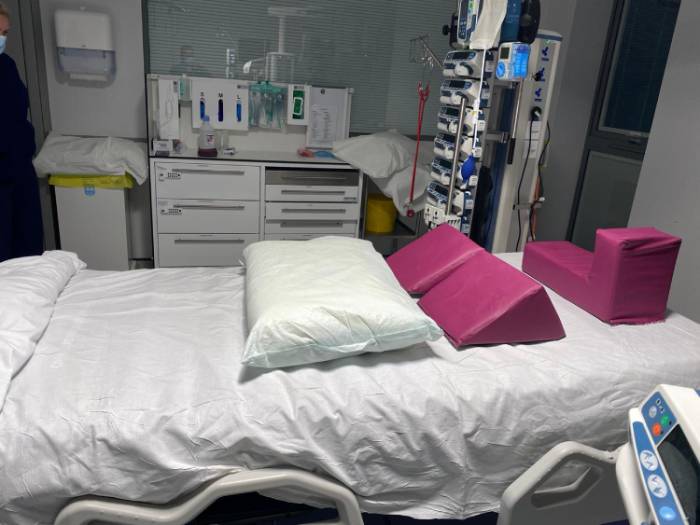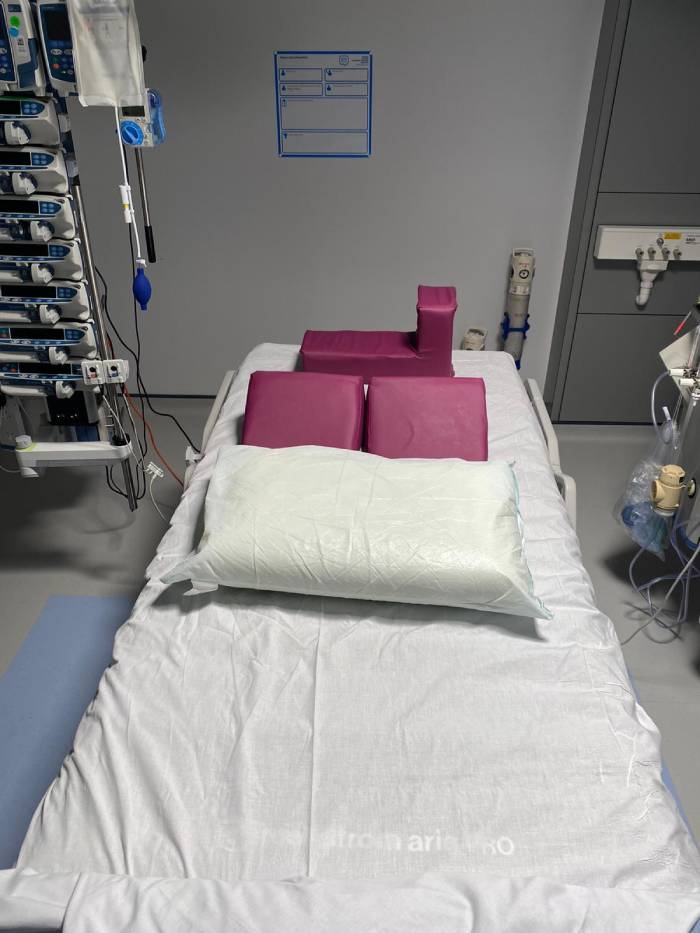Manchester-based company Posture Care has designed the new system, which makes it easier for COVID patients to breathe and sleep
 The unique four-cushion system helps nurses position patients in prone - a technique that sees patients lie on their front to improve the flow of oxygen-rich blood
The unique four-cushion system helps nurses position patients in prone - a technique that sees patients lie on their front to improve the flow of oxygen-rich blood
A new device that helps COVID patients breathe and sleep more easily is being used at Royal Preston Hospital in Lancashire after clinicians linked up with a Manchester-based healthcare company and scientists at the University of Central Lancashire (UCLan).
Posture Care – a company that works closely with patients suffering from debilitating conditions such as Multiple Sclerosis (MS) and catastrophic brain injuries – has developed a unique ‘Proning System’ which can help improve oxygen levels in patients that have contracted the virus.
Each kit is made up of four specially shaped cushions and is designed to support patients in a side-lying or prone position. Proning involves lying patients on their stomach.
All cushions use a special polyurethane foam created by Posture Care’s sister company, Levitex, which have pressure-relieving properties that have been evidenced in scientific research1.
The shape of each of the cushions provides support for a patients’ hips, chest and head in the prone position, but also the head, back, knees and ankles in a side-lying position. The pressure relieving properties of the cushions help to make the position more tolerable for patients.
National COVID treatment guidance recommends the use of prone positioning to improve oxygenation in patients as it is shown to redistribute lung expansion and allows blood flow to be more closely matched with ventilation.
During the first wave of the pandemic, Levitex donated 200 of its pressure-relieving pillows across North West hospitals, including The Royal Preston Hospital, to help staff put patients into prone position more easily.
Recognising the benefits of prone positioning, Dr Shondipon Laha, Consultant at Lancashire Teaching Hospitals NHS Foundation Trust, approached UCLan to look for a more sophisticated solution.
He said: “We approached Dr Ambreen Chohan and the MedTech Solutions Group at UCLan to help us find a company that could create a solution and that’s when we were introduced to the team at Posture Care.
“With the support of one of our physiotherapists, Simon Brady, a prototype Prone System was developed and informal feedback from initial testing on critical care patients showed that it helped significantly.”
Having previously researched a range of Posture Care and Levitex products, UCLan contacted the team at Posture Care and now five of the Proning Systems they have developed are in use across the Royal Preston Hospital’s Intensive Care Unit (ICU) and respiratory wards.
Dr Laha added: “We’ve seen clear evidence of success in using proning – a technique that is more commonly used for patients with pneumonia and on ventilators – in the fight against COVID.
“However, ICUs are facing a huge problem with helping patients that are not sedated to lie on their front for sustained periods of time as they simply can’t tolerate it. Many patients struggling to breathe are also fatigued, uncomfortable, scared and some are overweight or elderly, making it incredibly challenging for staff to re-position them throughout the day.
“We see huge potential for the Proning System for helping patients in ICUs but also as a possible solution for home use. More testing is needed, but hospitals up and down the country are facing a capacity crisis and anything we can do right now to help patients continue their treatment at home or, in some cases, potentially avoid the need for hospitalisation, could alleviate a lot of pressure.”
We see huge potential for the Proning System for helping patients in ICUs
but also as a possible solution for home use.
Led by Paul Brown, Head of Research & Innovation at Lancashire Teaching Hospitals NHS Foundation Trust, the early adoption of the Posture Care Proning Systems at the Royal Preston Hospital has been funded by the Lancashire Teaching Hospital Charity.
UCLan, which has been instrumental in connecting NHS Trusts to external medical experts, is now collaborating with Dr Laha’s team to assess the impact and effectiveness of the proning systems.
James Leinhardt, founder of Posture Care and Levitex, said: “We’ve been working with the team at Royal Preston Hospital for a number of years in their neuro rehab ward, helping to improve the night-time positioning of immobile and bed-bound patients.
“In April, our medical director at Levitex, Dr Ilan Lieberman, lead for Chronic Pain at University South Manchester Hospital, returned to the ICU during the first coronavirus wave and that’s when we first saw how the Levitex pillows could help ventilated patients remain in the prone position for extended periods of time.
“That’s what led to us donating so many pillows across the region, including to the team at Royal Preston Hospital, and creating an online self proning guide which has already been used by thousands of people.
“Our new Proning System takes that collaboration to the next level, helping patients tolerate the therapy of prone position for even longer periods and we are already in discussions with several NHS Trusts about a wider rollout.
“We’ve seen its success already and we hope this will help reduce the burden on clinical staff and lead to better patient outcomes, ultimately offering a life-saving solution for so many people in the fight against this terrible virus.
“The importance of positioning when it comes to any form of patient care is largely overlooked in healthcare but the combined mission of Posture Care and Levitex is to do everything we can to highlight this huge issue. On top of the Proning System, we are continuing our Research and Development with the help of UCLan that will help us finally put positioning and good posture on the healthcare agenda.”








